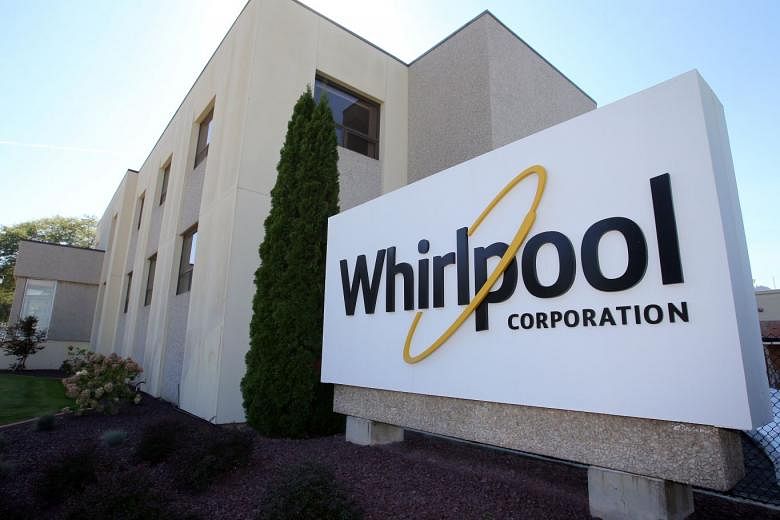WASHINGTON - The Trump administration's tariffs on washing machines and solar panels, aimed at South Korean and Chinese manufacturers respectively, may be the first shots in the trade wars he pledged to wage to protect American manufacturing jobs.
Analysts expect similar measures on steel, aluminium and other imported products from China in particular, whom Mr Trump and his advisors have long singled out as having taken unfair advantage of America's open markets while restricting access to the Chinese market for American corporations.
Time will tell if the measures on washing machines and solar panels will create jobs at home in America . Industry watchers said South Korean and Chinese manufacturers of appliances can get around the tariff by re-routing production to other countries, or finishing the assembly in the US itself, but American manufacturers welcomed the move.
"This is a victory for American workers and consumers alike," Whirlpool Corp Chairman Jeff Fettig said in a statement.
Whirlpool, whose Clyde, Ohio, factory at 3,000 employees and 20,000 washing machines a day is the world's largest producer, had sought the tariffs claiming South Korean firms Samsung and LG had gained market share in the US by selling their machines at below their production costs.
"From 2012 to 2016, imports of washers into the United States increased dramatically, causing a substantial loss in market share to domestic producers. By 2016, the domestic producers were running multimillion dollar net operating losses," the US Trade Representative (USTR) office said in a fact sheet.
A 20 per cent tariff will apply on the first 1.2 million imported washers in the first year, and a 50 per cent tariff on machines above that number.
"This announcement caps nearly a decade of litigation and will result in new manufacturing jobs in Ohio, Kentucky, South Carolina, and Tennessee," Mr Fettig said.
"By enforcing our existing trade laws, President Trump has ensured American workers will compete on a level playing field with their foreign counterparts, enabled new manufacturing jobs here in America, and will usher in a new era of innovation for consumers everywhere."
On the issue of solar panels - aimed mostly at China, the world's largest manufacturer - the USTR noted that from 2012 to 2016, imports grew by approximately 500 per cent.
"Prices for solar cells and modules fell by 60 per cent, to a point where most US producers ceased domestic production, moved their facilities to other countries, or declared bankruptcy," the USTR said.
"By 2017, the US solar industry had almost disappeared, with 25 companies closing since 2012."
On May 17, 2017, based on a petition from a company called Suniva, later joined by a second company SolarWorld, the bipartisan US International Trade Commission (ITC) started an investigation under Section 201 of the US's Trade Act.
Ironically, Suniva is majority Chinese owned, while SolarWorld is a subsidiary of a German company. Analysts say they have struggled because of the global oversupply of solar panels.
The USTR's decision was short of the companies' plea for a 50 per cent tariff, instead imposing a tariff of 30 per cent on imported modules and cells for the first year, falling gradually to 15 per cent in the fourth year.
But the solar industry is about more than solar panels. The Solar Energy Industries Association (SEIA) estimates that there were 38,000 jobs in solar manufacturing in the US at the end of 2016, with all but 2,000 making something other than cells and panels.
Thirty six thousand worked in support industries - metal racking systems, high-tech inverters, electrical products and installation.
The SEIA - the national trade association for the industry - in a statement said the new tariffs would cause the loss of roughly 23,000 American jobs this year, and create delays or cancellations of billions of dollars in solar investments.
"While tariffs in this case will not create adequate cell or module manufacturing to meet US demand, or keep foreign-owned Suniva and SolarWorld afloat, they will create a crisis in a part of our economy that has been thriving," said SEIA President and CEO Ms Abigail Ross Hopper.
Mr Eugene Wilkie, owner of a solar installer in Washington state, tweeted: "We are devastated to learn Trump has imposed a 30% tariff on solar panels virtually killing the solar industry. Solar employs more people than coal and oil combined.
"The solar industry employs the kind of "forgotten" Americans whom Trump champions: small contractors who employ blue-collar workers earning a median of US$26 an hour; one in 10 are veterans."


